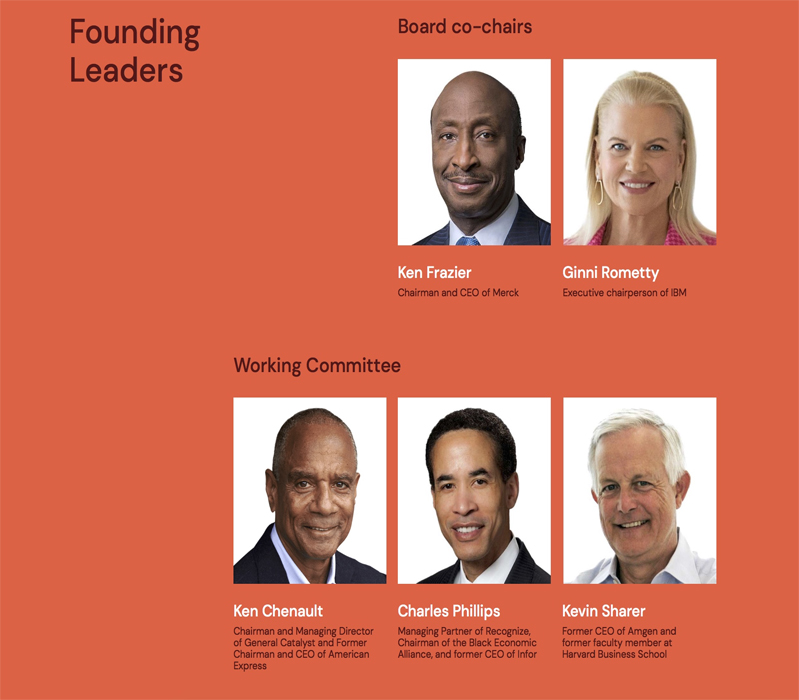A coalition of 37 CEOs and organisations have launched OneTen to upskill, hire and promote one million Black Americans over the next 10 years into sustaining jobs with opportunities for advancement.
These leading executives and employers across several industries are taking action to make a meaningful, measurable and lasting systemic impact on racial and economic justice and to create a more equitable society. They are committed to ensuring that Black Americans with the skills and aptitude to earn success also have the opportunity to achieve success.
“This is a moment in time for Americans to move past our divisions to come together and reach our full potential as a nation. Our country’s workforce of the future will be an increasingly diverse one,” stated Ken Frazier, Chairman and CEO of Merck, and one of the main founders of OneTen. “Through the creation of one million jobs for Black Americans over the next 10 years, OneTen has the potential to address persistent inter-generational gaps in opportunity and wealth.”
The other founders of OneTen include Ken Chenault, Chairman and Managing Director of General Catalyst and former Chairman and CEO of American Express; Charles Phillips, Managing Partner of Recognize, Chairman of the Black Economic Alliance and former CEO of Infor; Ginni Rometty, Executive Chairman and former CEO of IBM; and Kevin Sharer, former Chairman and CEO of Amgen and former faculty member at Harvard Business School. All five founders will serve on the Board of OneTen together with other participating CEOs. Ken Frazier and Ginni Rometty will serve as Co-Chairs.
ADDRESSING INEQUALITY
Recognising that the current system is not inclusive enough and has reinforced systemic barriers that have prevented many Black Americans from the opportunity to earn success, OneTen has set out to change the way companies provide more equitable environments to drive better business outcomes and benefit all employees. The newly established organisation will cultivate an ecosystem that brings together major employers, in partnership with the nation’s leading non-profits and other skill-credentialing organisations, to create a more flexible talent pipeline and practices that will allow employees and employers to thrive by shifting to a skills-first paradigm. It aims to connect employers with talent partners, leading non-profits and other skill-credentialing organisations that support the development of diverse talent.
“OneTen links our companies with the critical work we know we need to do to improve racial equity in America,” explained Ginni Rometty. “This will not only help our individual companies, but by removing structural barriers that have disproportionately hindered Black Americans from joining the middle-class, it will also help lift all Americans. By bringing together a coalition of key leaders and asking them to make long-term commitments, we have the ability to change employment practices and help break down systemic barriers opening the door to full participation in our economy.”

FOUNDING COMPANIES
OneTen is launching with the support of 37 founding CEOs and companies across industries. Members include: Accenture, ADP, Allstate, American Express, Amgen, Aon, AT&T, Bain & Company, Bank of America, Cargill, Caterpillar, Cisco, Cleveland Clinic, Comcast, Deloitte, Delta Air Lines, Eli Lilly, General Motors, HP Inc., Humana, IBM, Illinois Tool Works, Intermountain Healthcare, Johnson & Johnson, Lowe’s, Medtronic, Merck, Nike, Nordstrom, PepsiCo, Roper Technologies, Stryker, Target, Trane Technologies, Verizon, Walmart and Whirlpool Corporation.
The organisation will work with employers, education partners and upskilling partners to design educational and employment solutions. Together, these partners will better develop, retain and advance diverse and underrepresented talent, more broadly, but with an explicit commitment to hire or promote Black Americans without four-year degrees. OneTen’s role in the talent ecosystem will be local, reflecting the workforce development landscape, and focus on reducing exclusionary hiring practices, identifying robust and new talent sources, and ensuring that adequate and equitable career pathways for advancement exist. The organisation said it will begin working with partner employers to improve workplace inclusivity practices this month, and will connect talent providers to partner employers shortly thereafter.
Click here for more information.







































